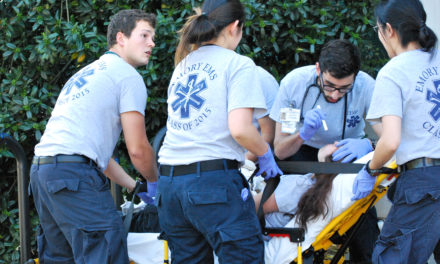The University welcomed race relations expert Beverly Daniel Tatum, president of Spelman College, to speak at College Council’s (CC) Social Justice Week’s 14th annual State of Race on Thursday evening. The week commenced on Monday with a documentary screening and will conclude today with a networking event for those interested in careers in social justice.
A diverse audience of students, faculty, alumni and Atlanta residents listened to her speech, entitled “Diversity, Democracy and Leadership: The Challenge of the 21st Century.”
Tatum began her portion of the night by addressing President Barack Obama’s two elections. She said his victories are a major indication of social change and attributed his win to “cross-racial coalitions.”
Tatum acknowledged, however, that despite the social changes of the past decade, the United States is not “post-racial” because people are still very well aware of racial differences.
College senior Shezza Shagarabi said she found Tatum’s point interesting.
“[Tatum] encapsulated a lot of issues that regarded race from the standpoint that post-racialism does not exist,” she said. “It can’t be just one person such as [Obama] getting elected to the White House for all these issues to be resolved.”
Tatum also encouraged the audience to always speak up in the face of racism and to seek out a dialogue with those uneducated about races outside their own.
She attributed a “sense of urgency” to the problem of racism. She added that leaders head social change, as people often look to authority figures to determine how to act. Tatum urged the audience to become leaders and create communities that welcome everyone, regardless of race or culture.
Tatum concluded with other dynamics of racial issues within and outside of college campuses, emphasizing the important role students can play in creating constructive dialogue about social justice.
Monday’s screening of the documentary “Girl Rising,” which is about girls’ access to education around the world, was followed by a panel discussion with the Presidents of Feminists in Action (FIA), Sexual Assault Peer Advocates and Amnesty International.
“Although there were many differences in opinion at the panel, I personally appreciate how everyone was comfortable sharing their views and how interactive and emotive the audience was,” said College junior and Wheel Editorials editor Priyanka Krishnamurthy, who served on the panel as the President of FIA.
On Tuesday, a showcase of slam poetry was held in Cannon Chapel. The event, entitled Café Unity, featured a duo called Sister Outsider Poetry. The two women, Dominique Christina and Denice Frohman, recited slam poetry inspired by civil rights activist Audre Lorde.
“The room was full of energy, snapping, oohs, ahhs and hollers – the standing ovation made it clear to me that the duo’s words were as meaningful to those in attendance as they have been for me,” said College senior Rachel Ezrol, who helped organize the event. “It’s powerful to have your ‘otherness’ celebrated and your individuality validated, something I think Sister Outsider Poetry does really well.”
She added that she was in awe of the students who decided to recite their own spoken work poetry after the performance.
The poems addressed a range of topics from political issues to personal experiences of the poets and centered on the experience of “otherness.”
“Watching these two women speak about deep and emotion filled stories while still keeping the entire performance relatively light-hearted was pretty incredible,” College sophomore Casey Costello said.
Wednesday evening, Reverend Joshua Nobitt, the minister of social justice at Saint Mark Methodist Church, and Jeff Graham, executive director of Georgia Equality, led a discussion about about the Lesbian, Gay, Transgender, Bisexual and Queer movement in the Dobbs University Center.
Social Justice Week will conclude with a roundtable discussion, whose panelists are made up of alumni in social justice careers. The panel is sponsored by the Student Alumni Board.
–By Rupsha Basu and Cindy Tang
The Emory Wheel was founded in 1919 and is currently the only independent, student-run newspaper of Emory University. The Wheel publishes weekly on Wednesdays during the academic year, except during University holidays and scheduled publication intermissions.
The Wheel is financially and editorially independent from the University. All of its content is generated by the Wheel’s more than 100 student staff members and contributing writers, and its printing costs are covered by profits from self-generated advertising sales.





